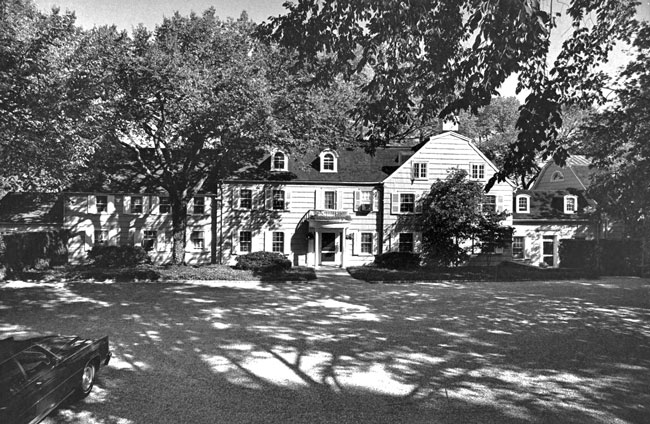Riversville Road estate on site of an 18th century farm

In 1904 a wealthy newcomer to Greenwich, William T. Carrington, acquired a farmhouse on Riversville Road dating back to about 1775 and set about turning it into a manor house. According to legend, the restoration and expansion took two tries. Carrington first commissioned a nameless carpenter to do a second-floor addition on a flat-roof wing and then set off on a trip with his wife, only to return and find a clumsy addition unrelated in style to the graceful old house he bought. So Carrington began again, this time under the guidance of the prominent architects Albro & Lindeberg. They dismantled what had been done and designed a manor house that has been admired for over a hundred years.
The farm’s antecedents went back to the purchase of 27 acres in 1743 by Joseph Marshall, Jr., a Quaker, whose extended family in the area led to the area’s being known as “Quaker Ridge.” Thirty years later the property belonged to Eliphalet Mead, who built the original house, and later to Benjamin Fairchild, from whom Carrington bought it. Carrington, a highly successful grain broker in his native Toledo, Ohio, and Chicago, named his Greenwich estate Denbigh Farm and retained it as one of several residences around the country until his death in 1931 in his Park Avenue apartment in New York City. At the time of his passing, Carrington was memorialized not only for his business success but also as a philanthropist, who had been a founder of the Chicago Symphony and the American Opera Company in New York, which for four years presented operas in English. Among his many activities, he had been a director of Bellevue Hospital and chairman of its finance committee.
His widow sold Denbigh Farm in 1935 to Joseph Verner Reed, a theatrical producer, author, diplomat, art collector and founder of the Triton Press, which published art reproductions. Reed was also notable as the developer of Hobe Sound in Florida. The civic-minded Reed served as president of Greenwich Hospital and Greenwich Community Chest, now United Way, and as chairman of the American Shakespeare Festival and Academy. His son, Joseph Verner Reed, Jr., became owner of Denbigh Farm in 1972 and resided there for more than two decades. Before embarking on an illustrious public career as U.S. Ambassador to Morocco, Chief of Protocol under President George H.W. Bush and Under-Secretary-General of the United Nations, Reed had been executive assistant to David Rockefeller, then president of Chase Manhattan Bank. Among the many decorations presented to Reed were the Legion of Honor by France and the Yale Medal by his college. In 1995 Denbigh Farm was bought by fashion mogul, Tommy Hilfiger, and his then-wife Susan, who still owns it.
The estate, with its old-time dignity and charm, includes the multi-winged, shingled manor house, a superintendent’s cottage and stables that once housed a groom, five horses and three cows. The main house has a distinctive gambrel roof with small, round-arched dormers, roofed in copper. The main entrance is sheltered by a rounded portico withTuscan columns and a cornice with balustrade. To one side is a carriage house, attached to a finely detailed water tower. Behind the house are an old orchard, a rose garden and a flowing brook.
—More than 280 properties have received Landmark Recognition status from the Greenwich Historical Society. Each month, Greenwich Time will look at one of these properties along with its history, courtesy of the Historical Society and Susan Nova Landmark Recognition committee.
Editor’s note: This is part of a series looking at historic homes in Greenwich.
